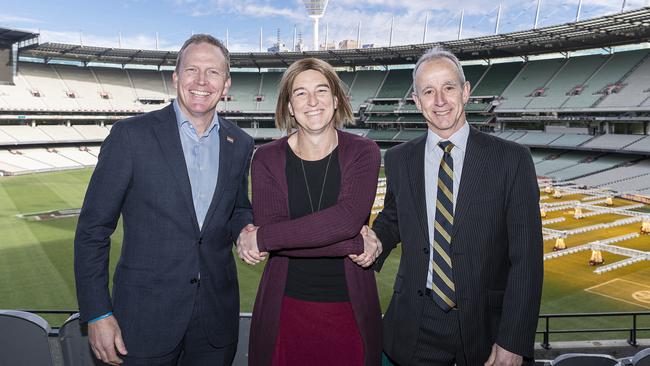Parent coaches warned on transgender discrimination
Coaches may be prosecuted unless they let anyone identfying as female to play in women’s team.

Mums and dads who run suburban and country cricket clubs could be prosecuted under state and federal discrimination laws for failing to allow anyone who identities as female to play in a women’s team.
The warning is contained in a new Cricket Australia transgender policy for community cricket, which also advises local clubs to provide gender-neutral change rooms and adopt gender-neutral pronouns.
Cricket Australia entered the fraught debate about gender identity and sport yesterday, releasing separate policies for the inclusion of transgender players in elite and community cricket.
The policy for elite cricket, consistent with the approach taken by the International Cricket Council, requires transgender players to keep their testosterone levels below a prescribed concentration for a 12-month period, sign a statutory declaration committing to their gender identity and to have their cases assessed by an expert panel.
The policy provides a pathway for a transgender woman to one day represent Australia in an Ashes series or World Cup.
Cricket Australia chief executive Kevin Roberts said the requirements struck a balance between letting transgender players participate and preserving the integrity of women’s competitions. The policy for community cricket requires only that a player declare their gender identity when they register for a competition and “demonstrate a commitment that their gender identity is consistent with their gender identity in other aspects of everyday life.”
The policy also advises local clubs and competitions to “give consideration” to players who are transitioning during a season. This means that a cricketer could start a summer playing as a male and end the season as a female.
It makes clear that any club or competition that fails to follow the policy could face prosecution.
“Under federal and state and territory law it is unlawful to discriminate on the basis of sex or gender identity in sport, unless an exemption applies,’’ the policy reads. “An association, club or indoor centre may be in breach of these laws if they do not follow these eligibility requirements.”
The twin policy was welcomed by transgender cricketer Erica James, who didn’t play for many years because she felt uncomfortable sharing a field with men. She now plays for the Universities Women’s Cricket Club in Sydney.
“I think the hardest thing is my own fear about what could possibly happen,’’ she told The Australian. “I have to say my experience has been entirely positive.”
Kirsti Miller, a transgender footballer who plays with NSW country club Broken Hill, said allowing transgender players into local cricket clubs would ease the isolation felt by gender diverse people. “We lose our families, we lose our jobs, we lose our houses and quite often our only family left is a sporting family,” she said.
“I found a sporting family out here that helped save my life.”
Australian women’s cricket captain Alex Blackwell said the eligibility process for transgender players in elite cricket would give confidence to other women players. “The policy recognises that at the elite level there has to be additional criteria to ensure a fair and safe and meaningful competition at the top level,’’ she said.
She welcomed the idea of someone born a biological male being able to one day play alongside Australia’s best women players. “I benefited so much from sport in elite teams,’’ she told the ABC. “I don’t think trans and gender diverse people should be excluded from that.’’



To join the conversation, please log in. Don't have an account? Register
Join the conversation, you are commenting as Logout